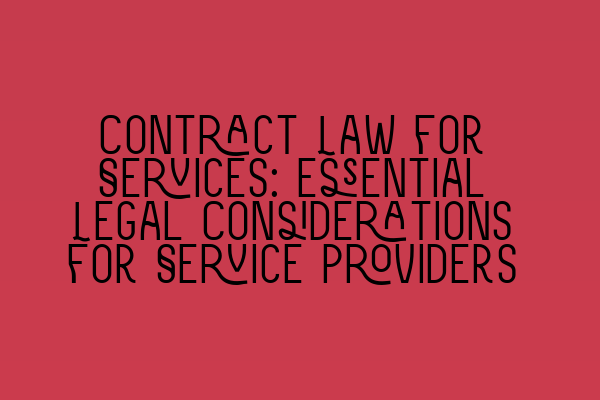Contract Law for Services: Essential Legal Considerations for Service Providers
As a service provider, it is crucial to understand the legal implications and considerations that come with entering into contracts with your clients. Contract law plays a fundamental role in ensuring that both parties uphold their obligations and protect their rights. To help you navigate this complex area, we have put together this comprehensive guide on contract law for service providers. Whether you are a freelancer, consultant, or operate a service-based business, these essential legal considerations will help you establish and maintain successful client relationships.
1. Understand the Elements of a Contract
Before delving into the specifics, it is important to have a solid understanding of the basic elements of a contract. A contract typically consists of an offer, acceptance, consideration, intention to create legal relations, capacity, and legality. Familiarize yourself with these essential components to ensure that your agreements are legally binding and enforceable.
2. Clearly Define the Scope of Services
One of the key aspects of contract law for service providers is clearly defining the scope of services you will be providing. This includes outlining the specific tasks or deliverables, timelines, milestones, and any other relevant details. By clearly defining the scope, both parties can have a mutual understanding of the expectations and minimize the potential for disputes or misunderstandings down the line.
3. Set Terms and Conditions
Having well-drafted terms and conditions is essential for protecting your interests as a service provider. These terms and conditions should cover areas such as payment terms, termination rights, intellectual property, confidentiality, dispute resolution, and liability limitations. Consider consulting with a contract law specialist to ensure that your terms and conditions are comprehensive and in compliance with the relevant laws and regulations.
4. Address Intellectual Property Rights
Intellectual property can often be a contentious issue in service-based contracts. It is crucial to clearly define who owns the intellectual property rights for any work created during the provision of services. This may include copyrights, trademarks, or trade secrets. Clearly stating the ownership and usage rights will help avoid any potential disputes in the future.
5. Specify Payment Terms
Clearly outlining the payment terms is vital for managing your cash flow and ensuring timely compensation for your services. Include details such as payment milestones, due dates, accepted payment methods, and any applicable late payment penalties. By setting clear expectations, you can minimize the risk of payment-related conflicts with your clients.
6. Include Confidentiality and Non-Disclosure Clauses
Confidentiality is often of utmost importance, especially when dealing with sensitive client information. Incorporating confidentiality and non-disclosure clauses in your contracts will protect both parties’ interests and ensure that any confidential information remains secure. Be sure to clearly define what constitutes confidential information and specify the obligations and remedies in case of a breach.
7. Consider Dispute Resolution Mechanisms
No matter how well-drafted a contract is, conflicts can still arise. Including a dispute resolution mechanism, such as mediation or arbitration, can help resolve disputes without resorting to costly litigation. By specifying the preferred method of resolution in your contracts, you can save time, money, and maintain a positive client relationship in the event of a disagreement.
If you are interested in learning more about navigating legal challenges and pitfalls in your practice, we recommend reading our related article: Navigating Legal Challenges and Pitfalls in Your Practice. It provides valuable insights and guidance for solicitors like yourself.
Conclusion
Contract law is a crucial aspect of conducting business as a service provider. By understanding and implementing these essential legal considerations, you can protect your interests, establish strong client relationships, and minimize the risk of disputes. If you require further guidance or assistance with contract law, it is advised to consult with a qualified solicitor experienced in contract law for services.
For more informative articles on law and legal practice, please explore the following resources:
